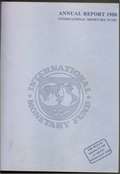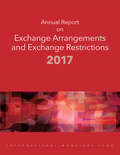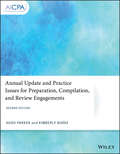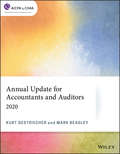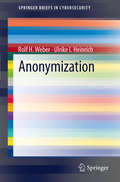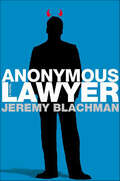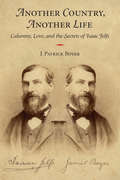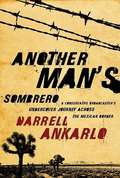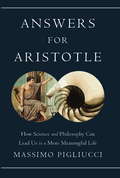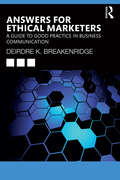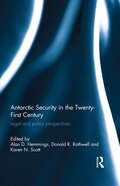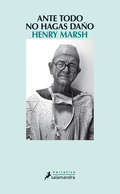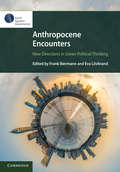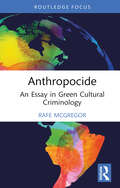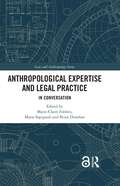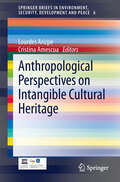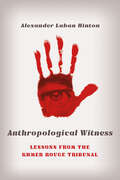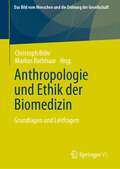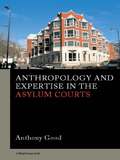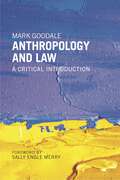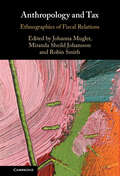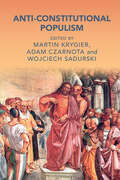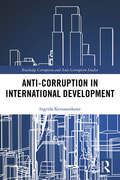- Table View
- List View
Annual Report on Exchange Arrangements and Exchange Restrictions 2017
by International Monetary FundA report from the International Monetary Fund.
Annual Report, of the Executive Board for the Financial Year
by International Monetary FundA report from the International Monetary Fund.
Annual Update and Practice Issues for Preparation, Compilation, and Review Engagements (AICPA)
by Hugh Parker Kimberly BurkeA practice-oriented review of the latest developments related to SSARS Nos. 21-24, this title includes a wide range of issues, including: Developments in the conceptual framework New and proposed independence interpretations Consideration of materiality in a review engagement Going concern considerations Restatement of prior year financial statements
Annual Update for Accountants and Auditors: 2020 (AICPA)
by Kurt Oestriecher Mark BeasleyKeep abreast of the fast-paced changes in accounting and auditing with relevant pronouncements, exposure drafts, and other guidance recently issued in the accounting, auditing, compilation, preparation, and review arenas. This book will help accountants and financial managers sort through the most recent accounting and auditing complexities so they can identify and apply recently issued FASB, PCAOB, and AICPA standards and guidance. New topics covered include: Revenue recognition Leases Financial instruments Intangible assets Consolidation Business combinations Recently issued SAS No. 134–140 Auditing interpretations Recently proposed SSAE standards Overview of SSARS guidance
Anonymization (SpringerBriefs in Cybersecurity)
by Rolf H. Weber Ulrike I. HeinrichWithin the last decade, the Internet has developed as a phenomenon encompassing social, cultural, economic and legal facets. It has become common practice to use the Internet for both the retrieval and provision of information, with the result that the Internet has become a valuable tool in everyday life. Many Internet participants are unaware that they leave data tracks on every website they pass; surfing on the World Wide Web is far from being an anonymous activity of no consequence. In recent years a number of networking techniques have been initiated in order to accommodate the netizen's wish for anonymous communication and the protection of their privacy in the online world. Anonymization explores the legal framework developed to help protect netizens' privacy and their wish for anonymous communication over the Internet. It debates the value in helping to protect anonymity over a network which sees an increasing number of cybercrimes, and explores governmental interventions into anonymity requests, and whether requests should only be legal if a sufficiently legitimized public interest is given.
Anonymous Lawyer: A Novel
by Jeremy BlachmanA wickedly funny debut novel about a high-powered lawyer whose shockingly candid blog about life inside his firm threatens to destroy himHe's a hiring partner at one of the world's largest law firms. Brilliant yet ruthless, he has little patience for associates who leave the office before midnight or steal candy from the bowl on his secretary's desk. He hates holidays and paralegals. And he's just started a weblog to tell the world about what life is really like at the top of his profession.Meet Anonymous Lawyer—corner office, granite desk, and a billable rate of $675 an hour. The summer is about to start, and he's got a new crop of law school interns who will soon sign away their lives for a six-figure salary at the firm. But he's also got a few problems that require his attention. There's The Jerk, his bitter rival at the firm, who is determined to do whatever it takes to beat him out for the chairman's job. There's Anonymous Wife, who is spending his money as fast as he can make it. And there's that secret blog he's writing, which is a perverse bit of fun until he gets an e-mail from someone inside the firm who knows he's its author.Written in the form of a blog, Anonymous Lawyer is a spectacularly entertaining debut that rips away the bland façade of corporate law and offers a telling glimpse inside a frightening world. Hilarious and fiendishly clever, Jeremy Blachman's tale of a lawyer who lives a lie and posts the truth is sure to be one of the year's most talked-about novels.
Another Country, Another Life: Calumny, Love, and the Secrets of Isaac Jelfs
by J. Patrick BoyerA young law clerk from England falls in love in 19th-century New York and reinvents himself in Canada. Quiet Isaac Jelfs led many lives: a scapegoated law clerk in England; a soldier in the mad Crimean War; a lawyer on swirling Broadway Avenue in New York. His escape from each was wrapped in deep secrecy. He eventually reached Canada, in 1869, with a new wife and a changed name. In his new home — the remote wilderness of Muskoka — he crafted yet another persona for himself. In Another Country, Another Life, his great-grandson traces that long-hidden journey, exposing Isaac Jelfs’ covered tracks and the reasons for his double life.
Another Man's Sombrero: A Conservative Broadcaster's Undercover Journey Across the Mexican Border
by Darrell AnkarloAnother Man's Sombrero explores issues raised by the personal stories of Mexican citizens sneaking into America and offers perspectives--often contradictory--from U.S. citizens.
Answers for Aristotle: How Science and Philosophy Can Lead Us to A More Meaningful Life
by Massimo PigliucciHow should we live? According to philosopher and biologist Massimo Pigliucci, the greatest guidance to this essential question lies in combining the wisdom of 24 centuries of philosophy with the latest research from 21st century science. In Answers for Aristotle, Pigliucci argues that the combination of science and philosophy first pioneered by Aristotle offers us the best possible tool for understanding the world and ourselves. As Aristotle knew, each mode of thought has the power to clarify the other: science provides facts, and philosophy helps us reflect on the values with which to assess them. But over the centuries, the two have become uncoupled, leaving us with questions—about morality, love, friendship, justice, and politics—that neither field could fully answer on its own. Pigliucci argues that only by rejoining each other can modern science and philosophy reach their full potential, while we harness them to help us reach ours. Pigliucci discusses such essential issues as how to tell right from wrong, the nature of love and friendship, and whether we can really ever know ourselves—all in service of helping us find our path to the best possible life. Combining the two most powerful intellectual traditions in history, Answers for Aristotle is a remarkable guide to discovering what really matters and why.
Answers for Ethical Marketers: A Guide to Good Practice in Business Communication
by Deirdre K. BreakenridgeWith recent changes in technology, media, and the communication landscape, the journey to ethics has become more complicated than ever before. This book aims to answer ethical questions, from applying ethics and sound judgment through your organization and communication channels to taking your ethics and values into every media interview. With the understanding of how personal and professional ethics align, business leaders, managers, and students will maneuver their way around this new landscape showcasing their values in ethical conduct. This book is divided into eight important areas based on where and why a breakdown in ethical behavior is likely to occur, and delivers advice from experts on the frontlines of business communications who know what it means to face the inherent changes and challenges in this field. With more than 80 questions and answers focused on guiding marketing, PR and business professionals, readers will uncover situations where ethics are challenged, and their values will be tested. This straightforward Q&A guidebook is for professionals who realize ethics are a crucial part of decision-making in their communications and who want to maintain trust with the public and their positive brand reputations in business. Readers will receive answers to pressing ethical questions to help them apply best practice guidelines and good judgment in their own situations, based on the stories, theories, and practical instruction from the author’s 30 years of experience as well as the thought leaders featured in this book.
Antarctic Security in the Twenty-First Century: Legal and Policy Perspectives
by Donald R. Rothwell Alan D. Hemmings Karen N. ScottThe Antarctic Treaty (1959) was adopted for the purpose of bringing peace and stability to Antarctica and to facilitate cooperation in scientific research conducted on and around the continent. It has now been over fifty years since the signing of the treaty, nevertheless security continues to drive and shape the laws and policy regime which governs the region. Antarctic Security in the Twenty-First Century: Legal and Policy Perspectives assess Antarctic security from multiple legal and policy perspectives. This book reviews the existing security construct in Antarctica, critically assesses its status in the early part of the Twenty-First century and considers how Antarctic security may be viewed in both the immediate and distant future. The book assesses emerging new security threats, including the impact of climate change and the issues arising from increased human traffic to Antarctica by scientists, tourists, and mariners. The authors call into question whether the existing Antarctic security construct framed around the Antarctic Treaty remains viable, or whether new Antarctic paradigms are necessary for the future governance of the region. The contributions to this volume engage with a security discourse which has expanded beyond the traditional military domain to include notions of security from the perspective of economics, the environment and bio-security. This book provides a contemporary and innovative approach to Antarctic issues which will be of interest to scholars of international law, international relations, security studies and political science as well as policy makers, lawyers and government officials with an interest in the region.
Ante todo, no hagas daño
by Henry MarshUn libro que ha cautivado y conmovido a crítica y público. Henry Marsh, el eminente neurocirujano británico expone a ojos del mundo la esencia de una de las especialidades médicas más difíciles, delicadas y fascinantes que existen. El resultado es este volumen que poco tiempo después de su publicación se encaramó a las listas de más vendidos del Sunday Times y el New York Times. Escogido «Mejor Libro del Año» por el Financial Times y The Economist, obtuvo los premios PEN Ackerley y South Bank Sky Arts y fue finalista del Costa Book Award, el Guardian First Book Award y el Samuel Johnson de no ficción. A los mandos de un microscopio ultrapotente y un catéter de alta precisión, el doctor Marsh se abre camino por los intersticios del cerebro. Con frecuencia, de su pericia y de su pulso dependen que un paciente recupere la visión oacabe en una silla de ruedas. Hay días en los que salva vidas, pero también hay jornadas nefastas en las que un pequeño error o una cadena de infortunios lo hacen sentirse el ser más desdichado sobre la faz de la Tierra. Mucho más cercano a una confesión personal que a una autobiografía complaciente con el autor, este libro -cuyo título se inspira en el juramento hipocrático- supone un auténtico alarde de valentía y de honestidad intelectual, un relato vibrante y luminoso que logra remover nuestros sentimientos más profundos y ensanchar nuestro umbral de sabiduría y compasión. Reseñas:«La neurociencia ha encontrado a su Boswell en Henry Marsh. Dolorosamente honesto sobre los errores que pueden "destrozar" un cerebro, exquisitamente sintonizado con el vínculo tenso y efímero entre médico y paciente, hilarantemente irritable ante la gestión hospitalaria, Marsh nos sumerge en el arte más difícil de la medicina y nos levanta el ánimo. Un logro soberbio.»Ian McEwan «Increíblemente absorbente [...]. Una visión tan sincera que sorprende y asombra.»Bill Bryson «El doctor Marsh revisa su vocación de una forma íntima, compasiva y, a ratos, aterradora.»Michiko Kakutani, The New York Times «Ante todo, no hagas daño es un conjunto de elegantes reflexiones al final de una larga carrera. Algunas de las historias son lo bastante emotivas como para llevarnos hasta las lágrimas [...]. En el fondo, éste es un libro acerca de la sabiduría y la experiencia.»The Telegraph
Anthropocene Encounters: New Directions in Green Political Thinking
by Frank Biermann Eva LövbrandCoined barely two decades ago, the Anthropocene has become one of the most influential and controversial terms in environmental policy. Yet it remains an ambivalent and contested formulation, giving rise to a multitude of unexpected, and often uncomfortable, conversations. This book traces in detail a broad variety of such 'Anthropocene encounters': in science, philosophy and literary fiction. It asks what it means to 'think green' in a time when nature no longer offers a stable backdrop to political analysis. Do familiar political categories and concepts, such as democracy, justice, power and time, hold when confronted with a world radically transformed by humans? The book responds by inviting more radical political thought, plural forms of engagement, and extended ethical commitments, making it a fascinating and timely volume for graduate students and researchers working in earth system governance, environmental politics and studies of the Anthropocene.
Anthropocide: An Essay in Green Cultural Criminology (Routledge Studies in Crime, Culture and Media)
by Rafe McGregorThrough an examination of Alfonso Cuarón’s Children of Men, this book demonstrates the ability of cinematic fictions, and other complex narrative fictions, to contribute to meeting the climate challenge by shaping the desires of audiences. What if there was a single feature film that showed us everything we need to know about climate catastrophe culture? What if that same film also made the philosophies of Slavoj Žižek, Mark Fisher, Francis Fukuyama, and Fredric Jameson accessible? Identifying the climate challenge as a cultural challenge, this book provides an unprecedented criminological analysis of both Children of Men and Fisher’s oeuvre from 1998 to 2022 and demonstrates the capacity of cinematic narratives to shape climate catastrophe culture. Seeking to be part of the solution to the climate challenge, it is the first criminological study to link the capacity of cinematic fictions to shape desire to solutions to the climate crisis. It is also one of the most detailed and most rigorous criminological case studies of a cinematic work to date.Anthropocide: An Essay in Green Cultural Criminology will be of great interest to students and scholars of green criminology, cultural criminology, narrative criminology, film theory, philosophy of film, and ecocriticism.
Anthropological Expertise and Legal Practice: In Conversation (Law and Anthropology)
by Brian Donahoe Maria Sapignoli Marie-Claire FobletsThis book draws on concrete cases of collaboration between anthropologists and legal practitioners to critically assess the use of anthropological expertise in a variety of legal contexts from the point of view of the anthropologist as well as of the decision-maker or legal practitioner. The contributions, several of which are co-authored by anthropologist–legal practitioner tandems, deal with the roles of and relationships between anthropologists and legal professionals, which are often collaborative, interdisciplinary, and complementary. Such interactions go far beyond courts and litigation into areas of law that might be called ‘social justice activism’. They also entail close collaboration with the people –often subjects of violence and dispossession –with whom the anthropologists and legal practitioners are working. The aim of this collection is to draw on past experiences to come up with practical methodological suggestions for facilitating this interaction and collaboration and for enhancing the efficacy of the use of anthropological expertise in legal contexts. Explicitly designed to bridge the gap between theory and practice, and between scholarship and practical application, the book will appeal to scholars and researchers engaged in anthropology, legal anthropology, socio-legal studies, and asylum and migration law. It will also be of interest to legal practitioners and applied social scientists, who can glean valuable lessons regarding the challenges and rewards of genuine collaboration between legal practitioners and social scientists.: The Open Access version of this book, available at http://www.taylorfrancis.com, has been made available under a Creative Commons [Attribution-Non Commercial-No Derivatives (CC BY-NC-ND)] 4.0 license.
Anthropological Perspectives on Intangible Cultural Heritage (SpringerBriefs in Environment, Security, Development and Peace #6)
by Cristina Amescua Lourdes ArizpeA decade after the approval of the UNESCO 2003 Convention for the Safeguarding of Intangible Cultural Heritage (ICH), the concept has gained wide acceptance at the local, national and international levels. Communities are recognizing and celebrating their Intangible Heritage; governments are devoting important efforts to the construction of national inventories; and anthropologists and professionals from different disciplines are forming a new field of study. The ten chapters of this book include the peer-reviewed papers of the First Planning Meeting of the International Social Science Council's Commission on Research on ICH, which was held at the Centro Regional de Investigaciones Multidisciplinarias (UNAM) in Cuernavaca, Mexico in 2012. The papers are based on fieldwork and direct involvement in assessing and reconceptualizing the outcomes of the UNESCO Convention. The report in Appendix 1 highlights the main points raised during the sessions.
Anthropological Witness: Lessons from the Khmer Rouge Tribunal
by Alexander Laban HintonAnthropological Witness tells the story of Alexander Laban Hinton's encounter with an accused architect of genocide and, more broadly, Hinton's attempt to navigate the promises and perils of expert testimony. In March 2016, Hinton served as an expert witness at the Extraordinary Chambers in the Courts of Cambodia, an international tribunal established to try senior Khmer Rouge leaders for crimes committed during the 1975–79 Cambodian genocide. His testimony culminated in a direct exchange with Pol Pot's notorious right-hand man, Nuon Chea, who was engaged in genocide denial.Anthropological Witness looks at big questions about the ethical imperatives and epistemological assumptions involved in explanation and the role of the public scholar in addressing issues relating to truth, justice, social repair, and genocide. Hinton asks: Can scholars who serve as expert witnesses effectively contribute to international atrocity crimes tribunals where the focus is on legal guilt as opposed to academic explanation? What does the answer to this question say more generally about academia and the public sphere? At a time when the world faces a multitude of challenges, the answers Hinton provides to such questions about public scholarship are urgent.
Anthropologie und Ethik der Biomedizin: Grundlagen und Leitfragen (Das Bild vom Menschen und die Ordnung der Gesellschaft)
by Christoph Böhr Markus RothhaarIn bioethische Kontroversen geht es zumeist um den Umgang des Menschen mit sich selbst, genauer: den Umgang mit den biologischen Grundlagen seiner – der menschlichen – Existenz. Bioethik verweist darum immer auch auf den Begriff des Menschen und damit auf die philosophische Anthropologie. Diese anthropologische Dimension der Bioethik bleibt allerdings oft unausgesprochen und unreflektiert. Der vorliegende Band versucht diese Lücke zu schließen, indem er die Bioethik, sowohl in den Grundlagen, als auch in der Behandlung konkreter Fragestellungen, von der Embryonenforschung und der Reproduktionsmedizin über die Gentechnologie und den sogenannten Transhumanismus bis hin zur Sterbebegleitung, konsequent vom Begriff des Menschen her zu denken versucht.
Anthropology and Expertise in the Asylum Courts
by Anthony GoodAlthough asylum has generated unparalleled levels of public and political concern over the past decade, there has been astonishingly little field research on the topic. This is a study of the legal process of claiming asylum from an anthropological perspective, focusing on the role of expert evidence from 'country experts' such as anthropologists. It describes how such evidence is used in assessments of asylum claims by the Home Office and by adjudicators and tribunals hearing asylum appeals. It compares uses of social scientific and medical evidence in legal decision-making and analyzes, anthropologically, the legal uses of key concepts from the 1951 Refugee Convention, such as 'race', 'religion', and 'social group'. The evidence is drawn from field observation of more than 300 appeal hearings in London and Glasgow; from reported case law and from interviews with immigration adjudicators, tribunal chairs, barristers and solicitors, as well as expert witnesses.
Anthropology and Law: A Critical Introduction
by Mark GoodaleAn introduction to the anthropology of law that explores the connections between law, politics, and technologyFrom legal responsibility for genocide to rectifying past injuries to indigenous people, the anthropology of law addresses some of the crucial ethical issues of our day. Over the past twenty-five years, anthropologists have studied how new forms of law have reshaped important questions of citizenship, biotechnology, and rights movements, among many others. Meanwhile, the rise of international law and transitional justice has posed new ethical and intellectual challenges to anthropologists. Anthropology and Law provides a comprehensive overview of the anthropology of law in the post-Cold War era. Mark Goodale introduces the central problems of the field and builds on the legacy of its intellectual history, while a foreword by Sally Engle Merry highlights the challenges of using the law to seek justice on an international scale. The book’s chapters cover a range of intersecting areas including language and law, history, regulation, indigenous rights, and gender. For a complete understanding of the consequential ways in which anthropologists have studied, interacted with, and critiqued, the ways and means of law, Anthropology and Law is required reading.
Anthropology and Tax: Ethnographies of Fiscal Relations
by Robin Smith Johanna Mugler Miranda Sheild JohanssonFrom the perspective of individual taxpayers to international tax norm negotiators, the anthropologists in this collection explore how taxes shape our world: our social relationships and value regimes, how we exclude and include, the categories we think with, and the way we share with each other. A first of its kind, it presents an anthropological discussion about tax rooted in ethnographic work. It asks fundamental questions such as: what is tax, what is taxable, and what do taxes do? By forwarding multiple perspectives from around the world about fiscal systems and how they are experienced and constituted, Anthropology and Tax reconceptualises tax in society. In doing so, this volume makes an incisive intervention in what might be one of the most important debates of our time – that of fiscal sociality. This title is also available as Open Access on Cambridge Core.
Anti-Constitutional Populism (Cambridge Studies in Law and Society)
by Martin Krygier Wojciech Sadurski Adam CzarnotaAround the world, populist parties have sprung up in formerly and formally liberal-democratic polities, challenging their existing political parties and leaders, and frequently overwhelming them. These challenges and successes were rarely predicted, arriving so soon after the wave of liberal democratic and constitutional enthusiasms, proclamations and institution-building which peaked in the 1990s. Bringing together scholars from law, political science and philosophy, this collection explores the character of contemporary populisms and their relationships to constitutional democracy. With contributors from around the world, it offers a diverse range of nuanced perspectives on populism as a global phenomenon. Using comparative and multi-disciplinary techniques, this book considers the specifics and similarities of populisms, and raises general questions about their nature and potential futures.
Anti-Corruption in International Development (Routledge Corruption and Anti-Corruption Studies)
by Ingrida KerusauskaiteCorruption is linked to a wide range of developmental issues, including undermining democratic institutions, slowing economic development and contributing to government instability, poverty and inequality. It is estimated that corruption costs more than 5 per cent of global GDP, and that more than one trillion US dollars are paid in bribes each year. This book unpacks the concept of corruption, its political and ethical influences, its measurement, commitments to combat corruption and ways that this is being attempted. Building on the research on the nature, causes and consequences of corruption, this book analyses international anti-corruption interventions in particular. It discusses approaches to focus efforts to tackle corruption in developing countries on where they are most likely to be successful. The efforts of the UK are considered as a detailed case study, with comparisons brought in as necessary from other countries’ and multilateral institutions’ anti-corruption efforts. Bridging a range of disciplines, Anti-Corruption in International Development will be of interest to students and scholars of international development, public administration, management, international relations, politics and criminal justice.
